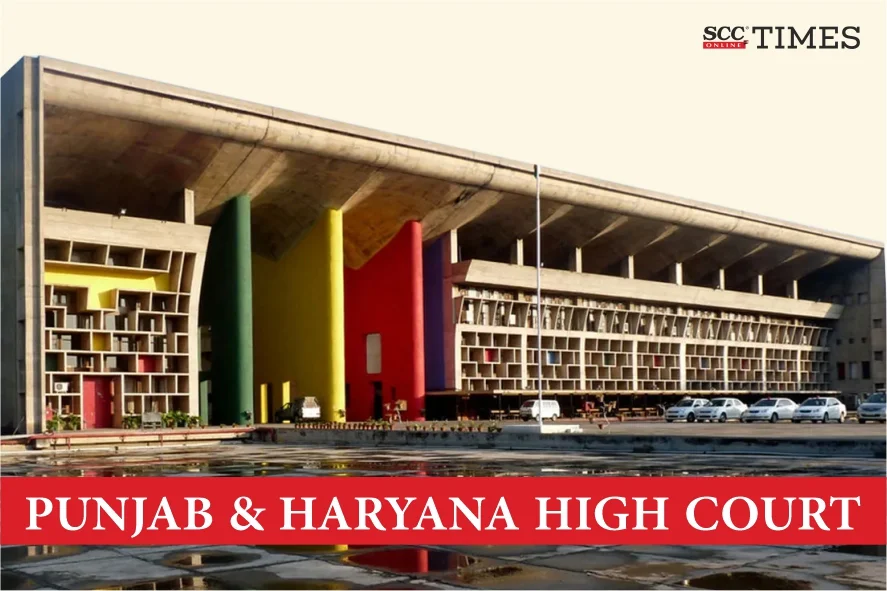Punjab and Haryana High Court: In a set of two criminal writ petitions filed by Vuenow Infotech Pvt. Ltd. (‘VIPL’) seeking inter alia directions to the Enforcement Department (‘ED’) to produce all the records regarding the inquiry being conducted against VIPL Section 37 of the Foreign Exchange Management Act, 1999 (‘FEMA’) read with Section 132 of the Income Tax Act, 1961 (‘IT Act’) as well as quashing of the ECIR, search and seizure proceedings, and freezing of VIPL’s bank accounts, the Division Bench of Sheel Nagu, CJ., and Anil Kshetarpal*, J., disposed of the petitions holding that it was not appropriate for the Court to interfere at this stage and granted liberty to VIPL to present their case before the Adjudicating Authority under FEMA and PMLA
Background
The ED initiated an investigation under FEMA against four companies, namely VIPL, Vuenow Marketing Services Ltd. (‘VMSL’), Zebyte Infotech Pvt. Ltd. (‘ZIPL’), and Zebyte Rental Planet Pvt. Ltd. (‘ZRPPL’). Initial investigations revealed that these companies received foreign inward remittances, but VIPL and VMSL did not declare them. Similarly, ZRPPL did not mention any export of service in their statutory monthly/ quarterly return, but in an inquiry, it was found that ZRPPL showed nine export invoices worth Rs 875 crores that were in contravention of FEMA.
It was also discovered that these companies had huge banking transactions amongst themselves, and they had dishonestly induced around 25,000 individuals/investors to invest in data center assets or cloud particles (also known as servers) through a sale and leaseback model wherein once a cloud particle was bought, it would immediately be leased back on a long-term basis by VMSL for a minimum guaranteed rent. Allegedly, VMSL received Rs 2236.07 Crores from the sale of cloud particles. Further, VMSL sold the cloud particles way beyond their actual capacity, i.e., with an active server capacity of 2,701 cloud particles, they sold 5 to 10 lakh particles. Thus, allegedly, a fraudulent investment scheme was being carried out wherein returns were paid to the previous investors using the capital from the new investors rather than the profits earned by the operation.
Thereafter, an FIR was registered under Section 318(4), 61(2), 316(2) of the Bhartiya Nagarik Suraksha Sanhita, 2023, and an ECIR was registered under Prevention of Money Laundering Act, 2002 (‘PMLA’). Preliminary investigation was conducted by ED under Section 37 of FEMA read with Section 32 of the IT Act. Certain bank accounts were frozen due to allegations of FEMA violations. Directions were also given to debit freeze some bank accounts held by VIPL and others. Additionally, despite summons being issued against the promoters and major shareholders/directors of the companies, none of them joined the investigation.
Analysis and decision:
The Court stated that although jurisdiction under Article 226 of the Constitution was plenary, there were self-imposed limitations that were required to be followed while exercising the power of judicial review. Ordinarily, interference during the investigation was not advisable because the law enforcement investigation techniques included coercive as well as covert techniques. Search and seizure was one such coercive tool. The Court said that though the Constitutional Courts were the sentinels of justice, this power was required to be exercised with due care and caution, and interference at the stage of investigation was made in rare and exceptional cases.
Regarding the contention that no prior notice was served before conducting the search and seizure, the Court stated that Section 37 of FEMA did not envisage any prior notice before conducting the search and seizure. The ED, under Section 37(1) and (2) of FEMA, was entitled to investigate the contravention referred to in Section 13. Further, Section 37(3) authorised the ED to exercise powers like those conferred upon income tax authorities under the IT Act. Similarly, Section 17 of PMLA did not provide for any such prior notice.
The Court noted that evidently while carrying out a search, proper information was supplied to VIPL. In the freezing orders sent to various banks, which VIPL had relied upon, it was clearly stated that ED had reasons to believe, from the documents in his possession, that the proceeds of crime might have been diverted to the banks.
Regarding the requirement of reasons to believe under Section 5 of PMLA, the Court placed reliance on Dilbagh Singh v. Union of India1. In Dilbagh Singh supra, while referring to Vijay Madanlal Choudhary v. Union of India (2023) 12 SCC 1, the Supreme Court held that the authorized officer could order provisional attachment only upon recording his satisfaction regarding the twin requirements. The officer had to form his opinion and provide written reasons for such belief based on the material in his possession rather than on mere assumptions.
The Court noted that Section 5(5) of PMLA mandated the ED to file a complaint, stating the facts of attachment of the property involved in money laundering, before the Adjudicating Authority (‘the Authority’) within 30 days. Upon such receipt of the complaint, the Authority had to decide the matter timely. Thereafter, an appeal was maintainable before the Appellate Tribunal against the final order of confirmation of attachment.
The Court held that since PMLA itself provided sufficient safeguards, it was not appropriate to interfere at this stage. Thus, the petitions were disposed of with liberty to VIPL to present their case before the Adjudicating Authority under FEMA and PMLA.
[Vuenow Infotech (P) Ltd. v. Union of India, 2025 SCC OnLine P&H 247, decided on 17-01-2025]
*Judgment authored by Justice Anil Kshetarpal
Advocates who appeared in this case :
For the petitioner: Chetan Mittal, Bipin Ghai, Akshay Kumar Dahiya, Arun Khatri, Mayank Aggarwal, and Nikhil Ghai
For the respondents: Additional Public Prosecutor J.P. Yagnik
Buy Constitution of India HERE
1. Civil Writ Petition No. 22688 of 2024







